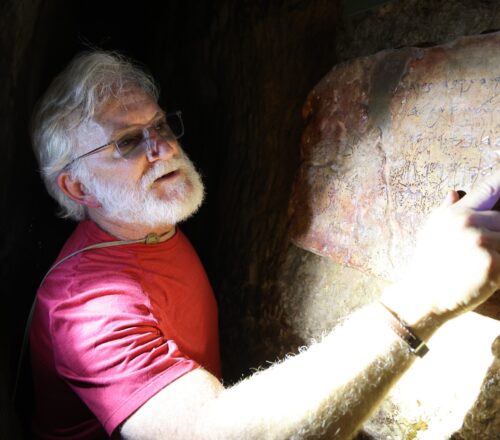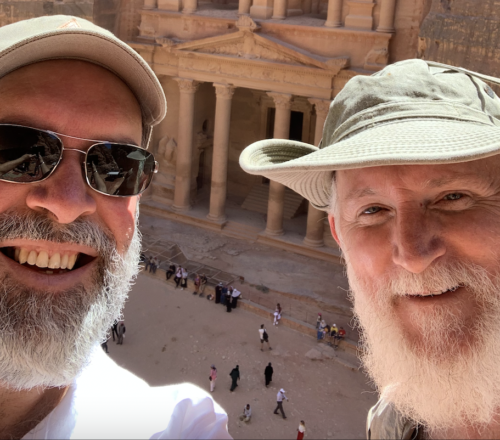Can Jews Gain Atonement for Sin Without a Temple? – Rabbi Yonathan Ben Avraham

How can Jews unburden themselves of their sin in absence of the Temple and the sacrificial system? This question is often raised by Christians in an attempt to highlight the Jew’s need for a messiah who will take their sin upon himself, namely, Jesus. But is there really such a need or is the remedy outlined plainly and simply within the pages of the Tanakh?
UTOM Facebook Page
Truth2U is only made possible though your kind donations. Please support the production of Truth2U programs. Thank you for listening!
Audio clip: Adobe Flash Player (version 9 or above) is required to play this audio clip. Download the latest version here. You also need to have JavaScript enabled in your browser.




that’s the thing… understand…. G O D / J E S U S is the biggest deception in history so far…. HOWEVER… We all, no matter who we are, need Yahuwah and Yahushua… go see for yourself at http://wwww.yahuwah.co.uk to resolve the name issue, then go to http://www.yahushua.net and see the difference between religion and truth… with all due respect… because… time is short.
https://www.youtube.com/watch?v=VZ4WGpGOQmk&list=PL42F8EC2D9D61F8AD&index=1
I wish it was longer! 🙂 Then what is the purpose of the temple?
A Holy dwelling for HaShem and Us to commune.
Christians say that G-d came to dwell on the earth as Jesus. But the bible says: “But will G-d indeed dwell on the earth? Behold the heaven and the heaven of heavens cannot contain You; much less this temple that I have erected.” 1 Kings 8:27.
First Temple’s dedication, given by King Solomon: “If they sin against You. . . and they repent and beg You. . .and say ‘We sinned, we acted crookedly, and we were wicked’ and they return to You with all their heart and all their being . . .praying to You t(then) You will hear their prayer and their begging and you will do right by them: You will forgive Your nation (for) . . .You listen to them whenever they call out to You…” (M’lachim Alef / 1 Kings 8:46-52).
No need for a blood sacrifice.
No need for an “human sacrifice” (aka Jesus).
Sheryl, you asked “what is the purpose of the Temple?” A better question might be “what is the purpose of life?” Why did G-d create human beings in the first place? Because the answer is the same.
G-d is absolutely perfect in Himself. He needs nothing (including sacrifices). There was no need for him to create this world, this universe or anything in it — including humans. So why did He? , “The world is built of love” (T’hillim / Psalms 89:3).
“G-d is good to all; His love is on all His works” (T’hillim / Psalms 145:9). G-d Himself called His creation good — B’reshit /Genesis 1:35. Man was created with intelligence, and free will. G-d wants us to experience the greatest possible good — but to do that we must have the ying and the yang — evil to understand the value of good. . . s Without evil good just “is” and we do not appreciate the value in it. “I form light and create darkness; I make peace and create evil; I am G-d. I do all these things” (Isaiah 45:7).
So evil is, in its own way good. “Behold, the fear of G-d, that is wisdom, and to depart from evil, that is understanding” (Job 28:28).
I’m getting to the Temple (really I am!).
G-d gave us an instruction book (the Torah). When we follow the guidelines in that book we do good, and we grow spiritually. There are 613 of those rules (mitzvot). Some mitzvot are “do this” and others are “do not do that.”
Knowing why G-d created mankind — out of love and with the ability to learn and grow into better beings — we can also understand why He does not force man to do good and obey His mitzvot. If G-d would force man to obey the mitzvot, their entire purpose would be negated. G-d may want us to do good, but only as a matter of free will.
Therefore the more mitzvot we can observe, which apply to us, the better spiritually we can become. Without a Temple there are a number of mitzvot which we are not allowed to observe. We are actually being observant by NOT doing things permitted only in the Temple walls. This is why the bible tells us “For I delight in loyalty rather than sacrifice, and in the knowledge of G-d rather than burnt offerings.” (Hoseah 6:6).
The Temple allows us to perform mitzvot only allowed within its walls. Jews want to fulfill as many of the mitzvot as we can (those that apply to us — because some only apply to priests, some only to kings, some only to farmers, some only to women, some only within the land of Israel and so forth). . . We want to again have a Temple so that we may fulfill more mitzvot.
But remember: To do what is right and just is more acceptable to the Eternal than sacrifice. [Proverbs 21:3]
I’ve always kind of felt that the prayer of Samson in the Temple of Dagon draws some similarities to the prayer of Mannaseh in captivity. Though there is no direct recording of words of repentance, there certainly must have been an attitude of that leading up to those words, no?
LOL – I LOVE IT! You guys just can’t quit mentioning me by name. I guess I must be a real threat to y’all….
Just so you will know, I didn’t “delete my question” on FB; I unfriended Rabbi Yonatan for breaking our agreement to NOT post on each other’s walls….He knows what I believe and I know what he believes. I kept my end of the bargain and refrained from posting on his wall. But then, when I saw him announcing this fact on his wall that I unfriended him and supposedly “removed my post” – obviously designed to solicit comments and support from all his followers (some of which were downright crude) – I decided to totally BLOCK him. And for that, I ended up being the subject of another radio podcast because, apparently, he just couldn’t let it go…
Actually, Carmen, we thought it was an excellent question that you raised and one worth addressing on air. Thanks again for asking it!
Well, in that case, you could have contacted me to ask me for the exact post/question so you wouldn’t have had to sit there and mention that the “post disappeared” and “Carmen blocked me,” etc. Your listeners didn’t need to know all that…But now they do.